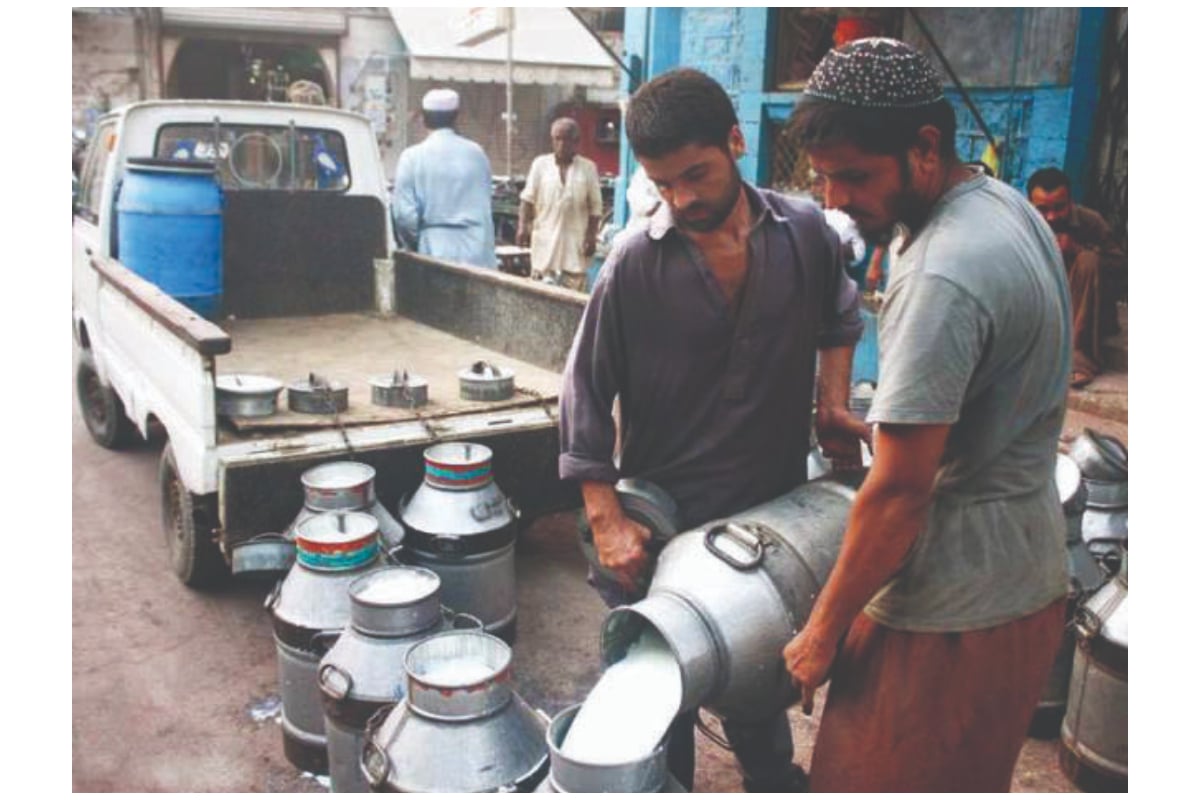
A poor man’s dilemma
Escalating price of milk takes toll on consumers
The arbitrary rise in the price of milk in Karachi has made it unaffordable for the majority of poor and middle-income groups.
The breadwinner of a family, earning in the range of 25,000 to 30,000 rupees a month, finds it impossible to buy milk because of the skyrocketing prices.
Razia, who works as a maid to feed her family and earns Rs12,000 monthly said, “I cannot purchase milk anymore. It is no longer for the poor who hardly afford two meals daily. I buy ordinary milk powder to make tea in the morning, but that too ends before I get my next pay,” she lamented.
Muhammad Hussain, a father of two, has to spend one-third of his income on buying milk for his children. He works as a salesman at a store and earns Rs25000, out of which he spends around Rs8000 to purchase milk. For other expenses, he works overtime. “Milk is being sold at Rs 200 per litre. I need one and a half litre, which costs around Rs300,” he said and added, “We are trying to cut down consumption in the wake of ever-rising prices of daily use items. This is when our salaries are the same and the rupee has lost value making it difficult for a middle-income family to meet their needs in this time of inflation.
The official price of fresh milk for Karachi was fixed at Rs120 last December, but the dairy farmers, wholesalers and retailers kept selling it at a much higher rate throughout the year. In October, the price of milk reached Rs200 a litre, showing an average monthly increase of Rs10 in the last ten months.
Once highlighted on the mainstream and social media, the news prompted the city administration to intervene and take measures against the arbitrary increase in milk prices. A crackdown was carried out against the wrongdoers besides arrests, fines and seizing vehicles carrying milk. The Dairy Cattle and Farmers Association has condemned the crackdown and threatened to further increase milk prices in retaliation to the government’s actions.

Finally, a discussion between Commissioner Karachi Muhammad Iqbal Memon and the association to set the new official rate of milk took place, and, as a result of the meeting, the city administration on October 25, fixed the official retail price of fresh milk at Rs 170 per litre with a jump of Rs50 from the previous price of Rs120 per litre.
Administration fails again
According to a notification issued by the commissioner Karachi, the retail price of fresh milk was fixed at Rs 170 per litre, while the wholesale and farm prices were fixed at Rs160 and Rs153 per litre respectively. Despite the official order, the retailers are selling milk at Rs180 per litre.
The President Dairy and Cattle Farmers Association, Shakir Umar Gujjar told this scribe that the cattle farmers have ensured that the milk will be supplied to the wholesalers at the notified price. However, the retailers have rejected the officially notified price of the milk and have decided to sell it at Rs180 per litre for the next 15 days. Gujjar claimed that the administration had agreed to hold another round of talks with the stakeholders, including farmers, wholesalers and retailers to jack up the price again because it was already a big jump of Rs50.
To a query in this regard, Gujjar said commissioner Karachi should work on reducing the production cost of milk. “Detaining vehicles and arresting or fining retailers was unjustified because it is they (farmers) who have raised the price and not the retailers,” he claimed. He also stated, “The cost of production of milk is Rs 200 per litre so how and why should it be sold at a lower price”, he questioned. He said that initially, the outbreak of lumpy skin disease on animals destroyed the farmers and then the floods drove the last nail in the coffin. Holding the ministry of Commerce responsible for the situation, Gujjar said that the incessant export of fodder without meeting the needs of the local cattle is a crime, due to which our farmers had to buy expensive imported fodder.
Moreover, the high cost of electricity and other expenses makes it impossible for us to supply milk at a lower cost. He added, “When we asked the Ministry of Commerce that the fodder should not be exported before meeting the need of the local livestock, they became offended. Their policies are enough to destroy the livestock industry,” he maintained.
He also claimed that the Economic Survey of Pakistan is constantly publishing inaccurate figures about the growth of livestock. According to him, cattle production has declined significantly over the last few years, owing to meat exports. He also said that the most recent livestock census was done in 2016 and the reports were based on guesses and manipulation.
Gujjar emphasised the importance of an increase in milk production using new techniques and genetic modification of livestock which the world had adopted long ago. He said, “The US is producing 60 per cent more milk from 30 per cent fewer cows than in 1967. This is because each cow produces over 2.5 times as much milk as it used to do some 50 years back.”
Catch all the Urban Insight News, Breaking News Event and Latest News Updates on The BOL News
Download The BOL News App to get the Daily News Update & Live News.












 Read the complete story text.
Read the complete story text. Listen to audio of the story.
Listen to audio of the story.